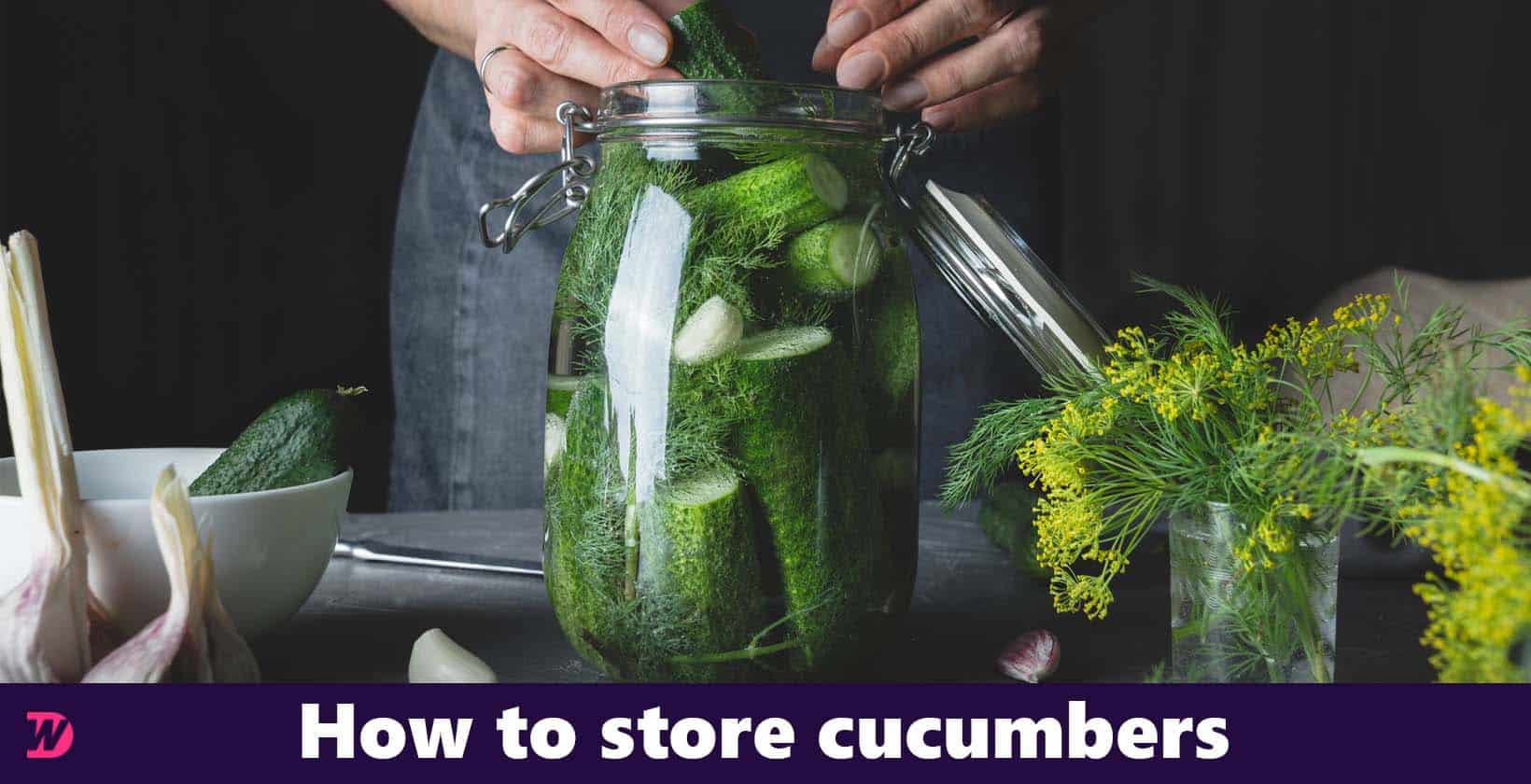Cucumbers are a staple in many households, adding a refreshing crunch to salads, sandwiches, and dips. They are one of the most delicate vegetables out there and can easily go from crisp to mushy if not stored properly. But with the right techniques and our helpful tips on how to store cucumbers, you can keep cucumbers fresh and delicious for longer.
VIEW IN GALLERY
How To Store Cucumbers
Spoilage of cucumbers can be attributed to the loss or buildup of moisture. To ensure the longevity of freshness, it is recommended to implement a protective shield for the cucumbers. This can be achieved by using a combination of paper towels to absorb surface moisture and a sealed plastic bag to protect from external factors. By following this method, cucumbers will remain fresh for an extended period.
How to Store Whole Cucumbers
The best way to store whole cucumbers is in the refrigerator. According to the USDA, “cucumbers should be stored at a temperature between 45°F and 50°F for optimal quality and preservation.” This will help keep them fresh and prevent them from becoming mushy or developing a strange texture. Here is a quick guide on how to store whole cucumbers:
- Choose ripe cucumbers: It’s important to select cucumbers that are firm, unblemished, and have a bright green color. Avoid cucumbers that are soft, wrinkled, or have yellow spots.
- Store in the right temperature: The ideal temperature for storing cucumbers is between 45°F and 50°F, which is the temperature of most home refrigerators.
- Wrap in a paper towel: Wrap each cucumber in a paper towel to absorb excess moisture, which can cause cucumbers to spoil more quickly.
- Place in a plastic bag: Place the wrapped cucumbers in a plastic bag and store in the refrigerator. Be sure to leave the bag slightly open to allow for air circulation.
- Use within 5-7 days: Whole cucumbers should be used within 5-7 days for best quality. Check the cucumbers regularly for any signs of spoilage, such as soft spots or an off odor.
How to Store Cut Cucumbers
Cut cucumbers, on the other hand, should be wrapped tightly in plastic wrap or stored in an airtight container in the refrigerator. This will help maintain their crispness and prevent them from drying out or absorbing unwanted flavors from other foods in the refrigerator. Here’s a quick guide on how to store cut cucumbers properly:
- Wrap them tightly: This will prevent air from reaching the cut surface and help to slow down the oxidation process.
- Store in the refrigerator: This will help to slow down the growth of bacteria and keep them fresh for longer.
- Use within a few days: Cut cucumbers should be used within a few days to ensure their maximum freshness. If you don’t think you’ll be able to use them all within that time frame, consider freezing them.
- Keep separate from ethylene-producing fruits: Cucumbers are sensitive to ethylene gas, which can cause them to spoil faster. Be sure to store cut cucumbers away from ethylene-producing fruits such as apples, bananas, and tomatoes.
How to Store Cucumber Slices
Storing cucumber slices is similar to storing cut cucumbers. Wrap them tightly in paper towel to remove excess moisture and store them in an airtight container in the refrigerator to keep them fresh and crisp. Below is a more detailed guide on storing cucumber slices:
- Use an airtight container: The first step to storing cucumber slices is to use an airtight container. This will prevent air from entering and drying out the slices. A container with a tight-fitting lid is ideal, such as a Tupperware or glass container.
- Wrap the slices in a paper towel: Before putting the slices into the container, wrap them in a paper towel. This will help absorb excess moisture, which can lead to spoilage.
- Place the container in the refrigerator: Once the slices are wrapped in a paper towel and placed in the airtight container, store the container in the refrigerator. The cooler temperature will slow down the growth of bacteria and help preserve the freshness of the cucumber slices.
- Consume within a few days: For best results, consume the cucumber slices within a few days of storing. This will ensure that they are fresh and crisp.
Can You Freeze Cucumbers?
Yes, you can freeze cucumbers, but it’s important to note that freezing can affect their texture. According to the USDA, “freezing cucumbers will result in a softer product when thawed.” If you plan on using them in a recipe, this may not be a problem. However, if you’re looking for a crunchy snack, freezing might not be the best option.
How Long Do Cucumbers Last in the Refrigerator?
Whole cucumbers will keep for 7 to 10 days in the refrigerator. Cut cucumbers, on the other hand, should be consumed within a few days to ensure their freshness and prevent spoilage. Below is a step-by-step guide on how to freeze fresh cucumbers:
- Clean and prepare the cucumbers: Choose firm, fresh cucumbers and wash them thoroughly under running water. Cut off both ends and slice the cucumbers to your desired thickness.
- Arrange the slices on a baking sheet: Place the sliced cucumbers in a single layer on a baking sheet, making sure that they are not touching each other. This will help them freeze evenly and quickly.
- Place the baking sheet in the freezer: Put the baking sheet with the sliced cucumbers in the freezer and let it freeze for about 2 hours.
- Transfer the frozen slices to a freezer-safe container: After 2 hours, remove the baking sheet from the freezer and transfer the frozen cucumber slices to a freezer-safe container or a resealable plastic bag. Make sure to label the container with the date and contents.
- Store the frozen cucumbers: Put the container with the frozen cucumbers back in the freezer and store it for up to 6 months.
When to Throw a Cucumber Out?
If your cucumber has become soft or mushy, or if it has any signs of mold or spoilage, it’s best to throw it out. Consuming spoiled cucumbers can lead to foodborne illness, so it’s important to be cautious.



















